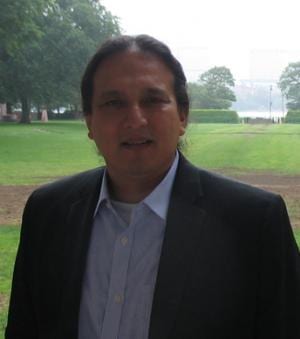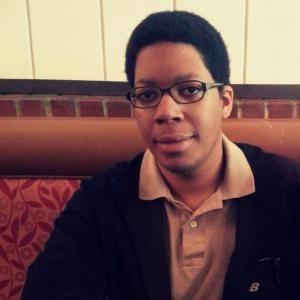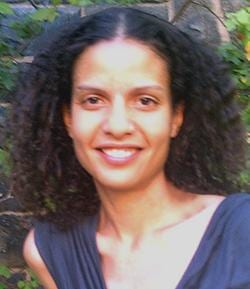2013 Provost’s Postdoctoral Fellows

John F. Lopez
Faculty Mentor: Claudia Brittenham. Department: Art History
John F. López earned a Ph.D. in 2013 from MIT’s History, Theory, and Criticism of Architecture and Art program, where he undertook a comparative study of the influence of Aztec and Spanish hydraulic practice on Mexico City. “The Hydrographic City” is a history of colonial Mexico City’s urban form told through its relationship to its lacustrine environment, its flood problems, and the engineering proposals offered to end catastrophic inundations. It investigates the respective flood control approaches of the Aztec (containment and regulation) and the Spanish (drainage, referred to as the desagüe) to show how each approach produced a different type of settlement. Through the study of Indian- and European-made maps of the city, among other historical documents, John explored the epistemological differences in how each conceived of the city and its relationship to the surrounding lakes. This research also traced the city’s transformation from island to reclaimed mainland, the result of the desagüe, a shift that was part of a colonial episteme that put the city at odds with the lakes and, just as significantly, called for a new urban aesthetic.
While at the University of Chicago, John will prepare a book manuscript based on his doctoral research. A second book-length project will scrutinize pre-Columbian architecture in the modern imagination. John has co-edited special issues of the Journal of Latin American Geography (2011), Ethnohistory (forthcoming), and Mexico’s Boletín de Monumentos Históricos (forthcoming), where he also published essays, and has a forthcoming article in the Rutgers Art Review. John has been the recipient of a Mellon Dissertation Completion Fellowship from the American Council of Learned Society, an International Dissertation Research Fellowship from the Social Science Research Council, and a Fulbright (to Mexico) from the Institute of International Education, among other awards.

Ellis Monk
Faculty Mentor: Elisabeth Clemens. Department: Sociology
Ellis Monk holds a B.A. in Sociology from the University of Michigan, Ann Arbor and graduated from the University of California, Berkeley with a Ph.D. in Sociology in May 2013. His dissertation, “Color, Bodily Capital, and Ethnoracial Division in the U.S. and Brazil,” is a comparative, mixed-methods study of the social and economic significance of skin tone and hair-type as markers of ethnoracial division among African Americans in the U.S. and within the Brazilian population at-large, which combines the quantitative analysis of several nationally-representative data sets and 100 in-depth interviews (50 in each country) to demonstrate that: (1) skin tone is as powerful a basis of intraracial stratification among African Americans as it is within the Brazilian population as a whole and (2) skin tone and hair are both powerful markers of social experience which are widely perceived to determine differential treatment in commercial, public, and intimate spheres alike. As an extension of this project, he has recently begun research on ethnoracial disparities in health which, thus far, focuses on the association between skin tone and mental and physical health among African Americans in the early 21st century. In addition, Ellis also examines contemporary ethnoracial politics in the United States. Inspired by ongoing theoretical work on race, political representation, and intersectionality, he has conducted a quantitative study of the relationship(s) between race, class, campaign finance, and roll-call voting behavior in the U.S. Congress. To date, his work has been funded by the National Science Foundation and the Ford Foundation and received recognition from the American Sociological Association. During his time at the University of Chicago, Ellis plans to revise and extend his dissertation into a book manuscript, continue his work on ethnoracial politics and intersectionality in the post-Civil Rights Era, and further develop his research on ethnoracial disparities in health.

Traci L. Parker
Faculty Mentor: Thomas Holt. Department: History
Traci Parker received her Ph.D. in History from the University of Chicago in December 2013. Prior to entering this doctoral program, she earned a M.A. in the Social Sciences Program from the University of Chicago in 2004. Her dissertation entitled, “Counter Strike: African Americans in American Department Stores, 1890-1989,” considers the efforts of African Americans, both as workers and consumers, in the desegregation of the department store industry. Specifically, her research examines the interrelationship between consumer capitalism and the configuration of race and class. Traci has received various fellowships and grants to fund her research including the University of Chicago’s Center for the Study of Race, Politics, and Culture Dissertation Fellowship and Graduate Research and Travel Grant, John Hope Franklin Fellowship, Andrew W. Mellow Research Fellowship, and a Hagley Museum and Library Exploratory Grant. As a Provost’s Career Enhancement Scholar in the Department of History, Traci will prepare and expand her dissertation for publication.

Sarah Elizabeth Vaughn
Faculty Mentor: Stephan Palmié. Department: Anthropology
Sarah Elizabeth Vaughn received her Ph.D. in Anthropology from Columbia University in 2013. She received her B.A. in the College Scholars Program (summa cum laude) with training in anthropology, critical theory, and comparative literature from Cornell University in 2006. Most broadly, her interests include political ecology and law, (post)colonial science studies, race and environmental security, and critical theory. During her time as a PCEPS, she will expand her dissertation, “Between a Promise and a Trench: Citizenship, Vulnerability, and Climate Change in Guyana,” into a book-length manuscript. It will explore the emergence of (inter)national legal and scientific mandates dedicated to climate adaptation measures, with a particular focus on the interplay between rights, expertise, and affect within the Guyanese public sphere. She has recently published an article on this topic, “Reconstructing the Citizen” in the journal Critique of Anthropology (32:4, 2012). While at Chicago, Sarah will also begin a second project that examines the cultural and institutional valuation of forests as “carbon sinks” and its relationship to the development of new labor regimes in the wider Guiana region.
Sarah is the recipient of a number of fellowships, awards, and grants to support her research including the Mellon/ACLS Dissertation Completion Fellowship, Elise Clews Parsons Student Paper Prize (American Ethnological Society), Woodrow Wilson Foundation-Mellon Mays Travel and Research Grant, and the Faculty Fellowship in the Department of Anthropology at Columbia University. Her research and cross-disciplinary interests have also been supported and inspired by her time as a Visiting Scholar at the Institute for Development Studies (University of Guyana, Turkeyen Campus), Mellon Graduate Fellow at the Interdisciplinary Center for Innovative Theory and Empirics (Columbia University), and Fellow at the Center for the Study of Ethnicity and Race (Columbia University).
